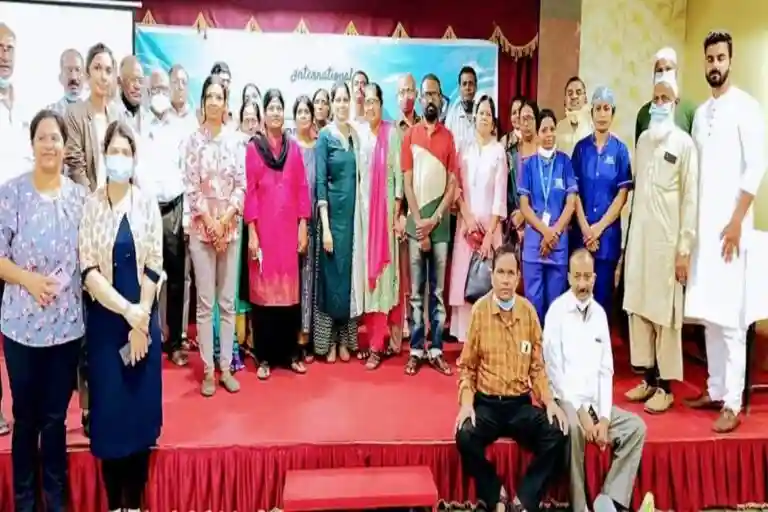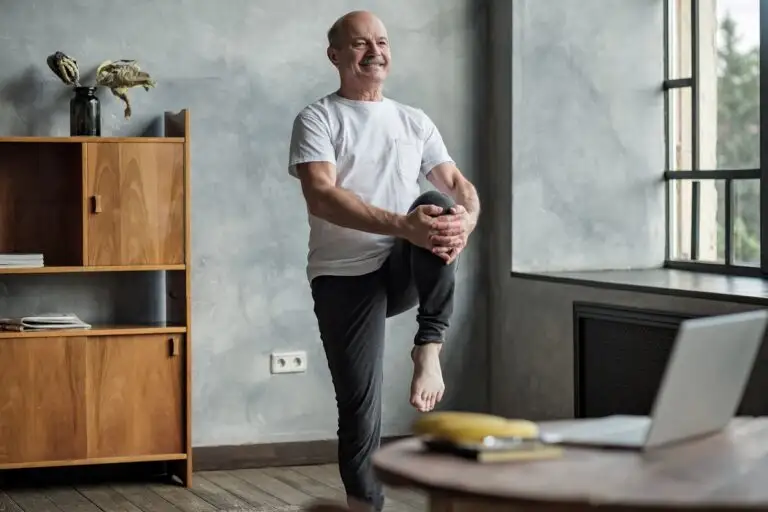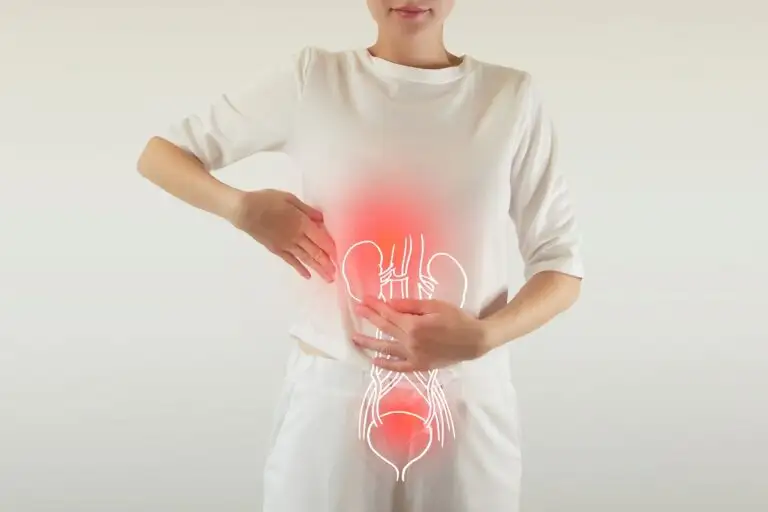Celebrates International Yoga Day with Dialysis Patients in Nagpur

Wockhardt Hospitals in Nagpur conducted an International Yoga Day special program for dialysis patients at Rastrabhasha Hall. The session was conducted by Dr. Suryashree Pandey (consultant-Nephrologist), Dr. Alka Nakade (Head Physiotherapist) & Yoga Expert Shailendra Raliya. The event was conducted with the intent to provide a better lifestyle to the patients undergoing dialysis through yoga. Simple exercises and asanas were taught to the patients and their relatives present at the occasion. More than 50 people gathered for this event. Yoga can be an excellent physical treatment for those who suffer from kidney disease. Yoga can play an important role in the overall health of kidneys. It improves the function of the kidney and can improve the quality of life for those with kidney disease while reducing the risk of kidney cancer. Yoga combines both physical and spiritual elements which help restores the body and revitalize the mind. Some of the poses in yoga can improve the health of the kidney and improve kidney function. This is an important step for preventing kidney problems and for slowing the progression of kidney disease. Wockhardt Hospitals keep ensuring the overall well-being of their patients and this activity was conducted keeping in mind the same. Dr. Suryashree PandeyConsultant NephrologistWockhardt Hospitals, Nagpur To book an appointment call: 0712-6624100 Source: https://thelivenagpur.com/2022/06/23/wockhardt-hospitals-nagpur-celebrates-international-yoga-day-with-dialysis-patients/
Can you Stand on One Leg for 10 Seconds?

Balance is the key to perfection – be it diet or workout – and now, a person’s ability to balance the body could also be indicative of longevity. At a time when several people are relying on health check-ups to check for disease risk, experts say that a balance test should also be included in the routine to ascertain how healthy or how long one is likely to live. For this, it is advised to remove the shoes and socks and place the front of the free foot on the back of the opposite lower leg while keeping the arms by the sides and gazing ahead. In the study, 1 in 5 people failed; additionally, 54 percent of 71 to 75-year-olds failed to strike a balance as opposed to 5 percent of 51 to 55-year-olds. Published in the British Journal of Sports Medicine, experts tracked the participants for years and after a seven-year follow-up, they discovered that 7 percent of the participants had died. 17.5 percent of the people who failed the test were part of the group who had failed the test. With this, experts concluded that the inability to stand on one leg for 10 seconds is associated with an 84 percent rise in early death risk. To know more about this link, Times Now Digital connected with Dr. Mohit Kukreja, Consultant Arthroscopy, and Sports Medicine Specialist at Wockhardt Hospitals. “This seems to be an observational study with a significant amount of arbitrary correlation and confounding factors involved. So we can’t be sure exactly what could be the reason for their inability to stand for less than 10 seconds. It could probably be poor health but could be some musculoskeletal or proprioceptive issues related to various systems of the body. So this statement cannot be accepted as a dictum and larger, prospective, and randomized studies need to prove this fact,” he said. “Of course, we advise single leg balance exercises to improve steadiness in old age and to improve joint proprioception after sports-related ligament surgeries of the knee. This reduces the risk of a fall in the geriatric population and is a very important milestone to progress post-surgery knee patients to more aggressive rehabilitation exercises respectively,” Dr. Kukreja concluded. Dr. Mohit KukrejaConsultant Arthroscopy and Sports Medicine SpecialistWockhardt Hospital, Mumbai Central To book an appointment call: 022-61784400 Source: https://www.timesnownews.com/health/can-you-stand-on-one-leg-for-10-seconds-study-reveals-what-it-could-say-about-your-health-article-92408550
Fourth wave fears: 10 tips to stay cautious amid spike in Covid cases in Mumbai

With the upward spiral of Covid-19 cases, Mumbaikars need to be cautious and take precautions. The majority of people have stopped wearing masks. To keep the fourth wave at bay, people should adhere to Covid protocols and continue to wear masks for some more time, say experts. Maharashtra had recorded 169 new cases on May 1, while on May 31 the daily rise in cases in the state was 711. Meanwhile, Mumbai on June 20 reported 1,310 new cases. The city’s overall tally of cases has reached 10,95,954 and the Covid-19 death toll to 19,585. The city now has 14,089 active cases. Dr. Mule suggested protective measures and safety tips: Speaking to Mid-Day.com, Dr Aniket Mule, consultant internal medicine, at Wockhardt Hospitals, said that if the cases continue to rise then the government will have to impose a lockdown. 1. It is possible to avoid the fourth wave if people adhere to the Covid protocols of masking, hand sanitizing, and social distancing. 2. Don’t forget to get fully vaccinated or take a booster shot if you are eligible. Doing so can reduce hospital admissions. Although there is no intimation from the official authorities on the possibility of the fourth wave, due to the rise in the number of cases we need to be cautious. If there is a detection of a new variant with serious disease-causing ability, then there can be a fourth wave. 3. Avoid going to crowded places and being around sick people. 4. Disinfect frequently touched surfaces such as door knobs, handles, faucets and kitchen countertops. 5. Since the monsoon is already here, there will be a surge in malaria, dengue and chikungunya and there are chances of Covid coinfection. Try to wear full-sleeved clothes to prevent mosquito bites. Use mosquito repellents, avoid water stagnation near the house and do not wade through rainwater. 6. Also, eat a well-balanced diet inclusive of all the vital nutrients. Give up on junk food and exercise indoors to boost immunity. 7. Since the cases are rising, limit the number of visitors at home. 8. Avoid going to work if you feel sick. 9. Do not send children to school if they are down with a cold and cough. 10. If you have symptoms such as cold, cough, fever or body ache then isolate yourself and do the tests suggested by the doctor as the symptoms of malaria, dengue and Covid-19 are similar. “It will be imperative for you to get the correct diagnosis and then immediately initiate the treatment,” he added. Is BMC prepared to tackle the latest surge? Dr Mangala Gomare, executive health officer, Brihanmumbai Municipal Corporation (BMC) shared, “Yes, we are seeing more cases, but this is not a wave, it is a spike or surge. We are seeing less number of hospitalisations, which is 3 to 5 per cent of the total positive cases. Ninety-six per cent of the cases are asymptomatic,” she explained. When asked if BMC is prepared to tackle monsoon and rising Covid cases together, Dr Gomare said, “This is not new to BMC as we have handled three Covid waves before. Previous ones were tough with the high demand for oxygen. During the third wave, we saw 20,000 cases reported in a day in Mumbai. So, now we are well-prepared for any such situation. We already have the infrastructure in place. Our people are now trained and have the experience along with treatment protocols in place. Hence, we are fully prepared. On the contrary, we have closed down some of the Covid centres. Now, we have more than 10,000 beds available in the dedicated covid hospital (DCH) and dedicated covid health centre (DCHC) in case there are more admissions. Even the active cases are few in Mumbai.” Dr Gomare urged people to not panic and asked senior citizens to get booster shots, “However, people should not take this lightly and follow proper Covid behaviour. Pregnant women, senior citizens and people with comorbidities need to be cautious as they have low immunity. Children in the age group of 12 to 17 years should get vaccinated,” she added. Dr Aniket MuleConsultant – Internal MedicineWockhardt Hospitals, Mira Road To book an appointment call: +918108101104 Source: https://www.mid-day.com/mumbai/mumbai-news/article/fourth-wave-fears-10-tips-to-stay-cautious-amid-spike-in-covid-cases-in-mumbai-23232473
Check-up for Covid-19? Get Full Body Check-up Done

As public health department, while doing door-to-door screening for the infection, could also test citizens for basic health conditions such as blood sugar, kidney, and liver function among others. They said the data from this will help the authorities come up with better healthcare plans and help arrest the spread as well as monitor high-risk patients better. Dr. Wiqar Shaikh expressed concerns about people with comorbidities not being traced and added that the infection may prove severe for such people, leading to prolonged hospitalization or even death. He quoted an article published in the British Medical Journal on June 15 which concluded that the risk is highest in people suffering from diabetes, obesity, and mental disorders. Dr. Shaikh also quoted the article which stated that 20 percent of people worldwide are estimated to be at higher risk of adverse COVID outcomes due to comorbidities and that the risk of death due to COVID-19 in patients with comorbidities is four-fold in the age group of 50 to 64 years and 10-fold in the age group above 85 years. An Indian study, published in the journal Biomed Research International on April 6, concluded that in India, the risk of complications increases with comorbidities, and the effect is magnified due to the contribution of single or multiple comorbid conditions. The study concluded that diabetes, high blood pressure, heart disease, and chronic kidney disease conferred the most severity in COVID-19. Dr. Shaikh asked the authorities to wake up and insisted that a door-to-door survey be conducted urgently to enumerate those who have comorbidities as well as those who have a fever. He added, “The civic body along with conducting door-to-door RT-PCR tests, should also screen people from slums, chawls, etc. for basic comorbidities by doing routine blood tests which will help ascertain the high-risk category of people. Such basic tests are cheap and won*t pinch the common man.” Dr. Santosh Bansode, Head of the Department, Emergency Medicine, Wockhardt hospitals, said, “Most people in our country don*t do preventive health check-ups and don*t know what comorbidities they may have. We have seen that people with comorbidities suffer more, so I feel that along with COVID tests, the government should do basic blood tests like blood sugar, creatinine level for kidney, and liver function tests so that we know which residential pockets have more people with comorbidities, so we can keep advanced COVID centers with all facilities to tackle serious illness ready.” Dr. Ketan Vagholkar, is also of the opinion that citizens should get basic health check-ups done as “this will enable the authorities to identify high-risk groups requiring prompt and urgent medical attention, in case of being diagnosed with COVID-19. Health authorities, while conducting door-to-door screenings should also consider free screening for comorbidities in areas which have a vulnerable population.” To book an appointment call: 022-61784444 Source: https://www.mid-day.com/amp/mumbai/mumbai-news/article/check-up-for-covid-19-get-full-body-check-done-too-experts-23232280
18-Yr-Old Teen Fought A Rare Fungal Infection; Goes Home After 2 Months

Recently, an 18-year-old girl, Ms. D Latha (Name changed for confidentiality), was admitted to Wockhardt Hospitals, Mumbai Central with complaints of fever and breathlessness. She had a history of fever for 4 months and headaches and was undergoing treatment at a private hospital in Raigad. The hospital at Raigad, suspected tuberculosis and she was treated accordingly, she showed improvement but later her oxygen levels started dropping, and thus she was rushed to Wockhardt Hospitals in Mumbai. Cryptococcus is an invasive fungus, transmitted through the inhalation of spores and causes cryptococcosis, an infection commonly associated with immunosuppressive individuals. Patients present with fever, headache, malaise, photophobia, and neck stiffness as cryptococcal meningitis sets in. This activity describes the evaluation and management of cryptococcosis and reviews the role of the inter-professional team in improving care for patients with this condition. According to Dr. Makhija, Consultant Neurologist, Wockhardt Hospitals, Mumbai Central, “At the time of arrival at Wockhardt Hospitals, she needed urgent ventilator support in view of severe breathing difficulty. She also complained of severe headaches and visual impairment; she had weakness involving all four limbs and could hardly move them. As part of her evaluation, she underwent MRI-BRAIN, CSF studies (investigation of brain fluid), and nerve conduction studies. Her investigations revealed a rare fungal infection of the Brain- cryptococcus which is otherwise seen in patients with weak immunity, in addition, she had a rare type of nerve weakness- Guillain-Barré syndrome (GBS) – a rare condition in which a person’s immune system attacks the peripheral nerves. In view of the history of recurrent joint pains, a Rheumatologist’s opinion was taken and diagnosed her to have SLE (Systemic lupus erythematosus). She remained in hospital for nearly two months during which she received IV immunoglobulins for nerve and immune dysfunction and antifungal therapy for her fungal infection. Eventually, after a long battle with multiple illnesses, she made a miraculous recovery; she was weaned off the ventilator, regained power in her limbs and is now fully independent, and has also started preparing for her exams for which she could not appear.” The family was happy that their teenage child was back home and said “We were blessed with a gift of hope when we met the team of doctors who treated our daughter at Wockhardt Hospitals, Mumbai Central. When our child was diagnosed with this rare fungal disorder, we were lost and distraught not knowing what next, especially when the hospitals at Raigad were not able to detect the cause. We thank the doctors and all the support staff at Wockhardt Hospitals, for sharing with us a timely course of treatment and progress during these difficult times, we truly experienced LIFE WINS… at Wockhardt Hospitals. Dr. Prashant MakhijaConsultant NeurologistWockhardt Hospitals, Mumbai To book an appointment call: +918291101001 Source: https://www.mumbailive.com/en/health/18-yr-old-teen-fought-a-rare-fungal-infection-in-2-months-73781
7 reasons why people find it tough to leave an unhealthy relationship

How many times have you found yourself wanting to end an unhealthy relationship, but you didn’t? Here’s why it’s so hard to get out of a relationship. Leaving a relationship is not as easy as it seems. There are a lot of emotions and memories associated with the person, which can cause people to stay in an unhealthy relationship. Furthermore, they are afraid of the change that can occur following the end of a relationship. No matter what the nature of a relationship is, we all want someone to love us. As a result, people expect everything to be fine one day and believe that’s how a relationship should be. That, however, is not the case. You should understand that if something does not make you happy, you should let it go. And it doesn’t take long for an unhealthy relationship to deteriorate into a toxic one. Let’s find the causes behind why people struggle to leave a relationship Researchers from the University of Minho in Braga, Portugal, believe they have discovered why people stay in bad relationships, and it may have something to do with the “sunk cost fallacy.” The “sunk cost fallacy,” according to researchers, is an effect in which people tend to stick with something because they’ve already invested so much time, money, and/or energy in it, making it difficult for them to let go – even if it’s not the best decision. To understand more about this, Health Shots got in touch with Dr. Sonal Anand, Psychiatrist, Wockhardt Hospitals, Mira Road, Mumbai. Here 7 major reasons why leaving an unhealthy relationship can be so difficult: 1. They have been in an enmeshed family “Sometimes families that don’t function well can have a lasting psychological impact. People who have been in such family environments are so used to it that they get used to unhealthy relationships as well and feel that this situation seems more familiar and so find it difficult to move away,” says Dr. Anand. 2. Learned helplessness Leaving an unhealthy relationship necessitates confidence and self-esteem. However, some people lack the motivation to leave an unhealthy relationship because they believe there is no way for them to escape their circumstances. They may believe that they will never find a solution or that they are the cause of the unhealthy relationship. And this can make getting out of the situation difficult. 3. Lack of control People who are in an unhealthy relationship frequently attempt to end it. But they don’t in the end. It occurs because some people have low self-esteem and, due to that, they believe they have no control over relationships and situations. As a result, people choose to stay rather than leave. 4. Expecting happier days are around the corner People stay in unhealthy relationships because they believe they have invested significant time and energy in this relationship. As a result, they anticipate that everything will be fine one day. Dr. Anand says, “It’s normal to hope for better days, but sometimes this hope can get too prolonged and lose objective.” 5. Common friends and family relationships Social norms may require perfectionism in relationships, putting pressure on both partners. The individual may believe that he or she will not be socially accepted without a partner among close common friends or even family members. That makes it hard to break up. “Even the obligation of children can be a factor here. Some people endure just for the sake of their children,” says Dr. Anand. 6. Being clueless Some people are unaware that they are being manipulated and believe their unacceptable behavior patterns are simply errors. As a result, they make do with what they have. It could also be a first-time relationship, making quitting difficult. 7. Previous heartbreaks Some people go through difficult breakups and don’t want to go through heartbreak again. They could also become dependent and believe that they can’t live without that person. So they refuse to leave. Dr. Sonal AnandConsultant – PsychiatristWockhardt Hospitals, Mira Road To book an appointment call: +918108101104 Source: https://www.healthshots.com/mind/emotional-health/why-is-it-so-difficult-to-leave-an-unhealthy-relationship/
Gas Pain in Chest: Home Remedies for Gas Pain in Chest

Experiencing gas pain in the chest can be troublesome. Here’s why gastric issues cause chest pain and how to get rid of it. Have you ever felt a sharp pain in your chest and thought you were having a heart attack? Chest pain, ladies, is not always the symptom of a heart attack. It is still possible to experience it if you have gas and acidity. Gas pain in the chest is usually not a cause for alarm. However, the discomfort and pressure it exerts can make your situation uncomfortable and painful. This burning and stabbing sensation in the chest can be due to different signs of digestive issues such as indigestion, acidity, bloating, or extreme burping. HealthShots spoke to Dr. Mrudul Dharod, Gastroenterologist, Wockhardt Hospitals, Mira Road, Mumbai, about this condition. Symptoms of Gas Pain in the Chest Burning and discomfort are common symptoms of gas pain in the chest. There is a chance that this pain may spread to the abdomen. Stomach-related chest pain symptoms may include the following: Difference Between Heart Pain and Gas Pain in Chest It’s critical to distinguish between heart pain and gas pain in chest to provide the right care and prompt medical attention. Here are some of the main indicators that will help you distinguish between the two: Nature of Pain Duration and Persistence Associated Symptoms Triggers and Timing Seeking medical attention as soon as possible is advised if you are not clear whether the pain in your chest is being caused by gas or a heart attack. Causes of Gas Pain in Chest “Dr. Dharod says that lactose intolerance, gluten sensitivity, eating too many artificial sweetener-based foods, drinking too many carbonated beverages or colas and sodas, eating a lot of high fiber foods, and other factors can cause significant gas in the digestive system, mimicking chest pain. The sensation can cause anxiety and even palpitations or panic attacks. Gallstone pain or gallbladder inflammation can occasionally cause similar symptoms. As we said, tightness or pain in the chest is not always indicative of a heart attack, but it is an important indicator of a heart attack. So, if you experience chest pain or discomfort, see your doctor right away.” The following are the gas pain in chest causes: Gas Pain in Chest: Is it Due to Acidity, Gas, or a Heart Attack? Pain in the chest, especially in the center or left side, is always a symptom of concern. Though we commonly consider chest pain as a symptom of a heart attack, it can also be caused by acid reflux or a collection of gas. “Acid reflux (also known as gastroesophageal reflux disease or GERD) occurs when stomach acid leaks into the esophagus, causing symptoms such as chest pain, heaviness, or burning” says Dr. Dharod. Gas accumulated in the stomach, small intestines, or colon (large intestine) can cause upper abdominal discomfort, which patients frequently misinterpret as central chest pain. Home Remedies for Gas Pain in Chest 1. Drink warm liquids and herbal teas Drinking enough water throughout the day is critical for preventing many problems, including gas. Water can aid in passing the excess gas through the digestive tract and can ease gas pain and discomfort. Warm water or herbal teas can be very relaxing. Cucumber juice, coconut water, ajwain water, and saunf water are also options. 2. Have ginger Another home remedy that can help with digestive issues such as gas is ginger. Have ginger tea and you will surely notice the difference. Its anti-inflammatory properties aid in the relief of gas, acid reflux, and heartburn. It can be eaten by adding it to soups, sabzi, and curry. Drinking a cup of ginger tea is the best way to get immediate relief. 3. Avoid gluten and dairy products If you notice gas pain in your chest then make sure to stay away from carbonated drinks and sodas, milk and dairy products, and gluten. 4. Exercise every day Staying physically active is critical for digestive health. Walking, swimming, yoga, or any other form of exercise can help you pass gas and manage your chest pain. 5. Avoid spicy Acidity and gas are commonly caused by eating spicy, oily, or contaminated food. So, avoid eating heavy and greasy meals if you want to stay away from stomach gas. Instead, include oats, khichdi, green leafy vegetables, vitamin C-rich foods, nuts, seeds, and egg whites in your diet. Dr. Mrudul DharodConsultant – GastroenterologistWockhardt Hospitals, Mira Road To book an appointment call: +918108101104 Source: https://www.healthshots.com/preventive-care/self-care/gas-pain-in-chest-5-home-remedies-to-cure-gas/ FAQs on Gas Pain in Chest Q. Is the gas in my chest serious? Gas in the chest is typically not serious and often related to digestive issues. However, persistent or severe chest pain should be evaluated by a healthcare professional to rule out more serious conditions, such as heart problems. Q. Can stress cause gas? The emergence of gas in the digestive tract can be attributed to stress. Stress can alter the gut bacteria, impact digestion, and disrupt eating habits, all of which may result in increased gas production. Q. How long does gas pain in the chest typically last? Gas pain in the chest is usually temporary and may last for a few minutes to a couple of hours. The time period may depend on factors, such as the primary problem, eating habits, and poor digestive system. In case the discomfort persists or is too intense, medical attention for thorough evaluation becomes necessary. Q. Can gas pain in the chest be a symptom of a digestive system infection? In some instances, gas pain in the chest can be indicative of an infection in the digestive system, particularly gastroenteritis. Infections can result in inflammation and disruption of gastrointestinal tract function, ultimately causing bloating as well.
Woman Turns Out to be a Patient of Rare Tumor

NAGPUR: A 26-year-old woman suffering from an extremely rare ailment was successfully treated by Uro-Oncologist Dr Uday Chandankhede at Wockhardt Hospital. Interestingly, the woman underwent many types of investigations and even two failed surgical attempts in the last 2 years because doctors did not even suspect that she could have paraganglioma — a rare type of tumor — near her urinary bladder. Dr Chandankhede said his special training in diagnosing and treating cancers of the urinary tract came in handy here and he could diagnose this tumour which happens to 2 out of 10 lakh people in the world. The tumour was removed surgically and the woman is now living a completely normal life. “Initially, her MRI and CT scan were suggestive of a mass lesion (abnormal tissue) located in her bladder. She had minimally invasive surgery to remove this mass but at the time of surgery, the mass was not seen in the bladder,” Dr Chandankhede said. “After studying her case, I was sure that it was not a case of urinary tract infection but something related to the hormones. When the patient said that she experiences a kind of giddiness, palpitation after passing urine, I suspected that it could be a paraganglioma,” Dr Chandankhede said. Paraganglioma is a rare kind of tumour. It has cells that commonly secrete hormones known as catecholamines, including adrenaline, which is the fight-or-flight hormone. This can cause episodes of high blood pressure, a rapid heartbeat, sweating, headache and tremors. A specific blood test called plasma-free nor-metanephrines proved this diagnosis correct. “In this case, the paraganglioma was at one of the extremely rare locations in between her urinary bladder and track. While urinating, it used to get active and secrete hormones. As a result, her blood pressure which used to be normal at 110/70 before passing urine used to shoot up to 180/110 afterwards,” said Dr Chandankhede. Finally, he decided to remove the tumour surgically by open surgery as the tumour was not visible in minimally invasive options. The woman underwent a successful surgery of the mass excision and was kept in ICU for blood pressure monitoring. She was discharged in stable condition with normal blood pressure. “These tumours are non-cancerous. The woman is leading a normal life and she can also plan pregnancy now,” said Dr Chandankhede. The family members of the patient said that they were suffering from tremendous mental stress for the last two years and they had prepared to remove the uterus also to get rid of this pain. Her husband said that she has received a new lease of life. To book an appointment call: 0712-6624100 Source: https://timesofindia.indiatimes.com/city/nagpur/treated-as-urine-infection-for-years-woman-turns-out-to-be-a-patient-of-rare-tumour/articleshow/92135050.cms
How to stop being groggy in the morning? These 9 tips can help

It’s not easy to wake up fresh every morning. However, with these 9 tips, it’s possible to kick-off morning fatigue and grogginess. Do you constantly press the snooze button in the morning? Sleeping for an extra five to ten minutes may seem divine. However, they can often cause morning fatigue and grogginess! Certain morning habits can help you re-energize, eliminate stress, and build focus commonly caused by the chaotic morning rush. According to a study published in the Journal of the American Medical Association, morning habits help create a happier life, complete with fulfillment and maximum productivity. Health Shots spoke to Dr. Aniket Mule, consultant internal medicine, Wockhardt Hospitals Mira Road, Mumbai, to find some great tips that can help make the morning energetic and refreshed. 9 tips to avoid morning fatigue and stop feeling groggy: 1. Do not hit the snooze button Say no to snoozing, ladies! You must avoid falling asleep again. If you do so, you will end up feeling fatigued and inactive. Try to get up and start the day immediately after the alarm rings. Also, keep your alarm away from your bed instead of keeping it next to you so that you’ll be forced to get up and move your body to turn it off. 2. Start the day with a glass of water In any case, it is a good idea to be well-hydrated. Starting your day by drinking a glass of water can help to keep your morning laziness at bay. Water will flush out the toxins from the body, which means a healthy gut and a glowing you. Dr. Mule says, “If you feel fatigued in the morning, it is probably due to dehydration. Having a glass of water will freshen you up before starting the day.” 3. Get sunlight exposure Sunlight, especially the one soaked in the morning, helps boost serotonin in your brain, which can give you more energy and keep you calm, positive, and focused. Avoid being in the sun at noon, when it is at its highest point and emits the most UVB rays. It’s a tried-and-true method for getting your lazy ass out of bed. 4. Indulge in yoga Getting some physical activity in the morning is the best thing you can do for your health. Exercising or practicing yoga can be the body’s natural way of waking itself up after being immobile for long hours during the night. Dr. Mule says, “Stretch, do yoga, or even other exercises like walking after waking up to avoid being groggy. Doing so can help you stay energized.” Try to do some form of exercise in the morning without fail. 5. Listen to soothing music A study published in the journal BJPsych International states that music stimulates our brain circuits and boosts both creativity and productivity. So if you really want to say bye-bye to morning tiredness and laziness, listen to music, and lift your mood. 6. Eat a healthy breakfast Breakfast is the most important meal of the day, and you cannot afford to skip it. According to Dr. Mule, “Skipping breakfast will leave you more tired. So, eat oats, fruits, or eggs. But, avoid high carbohydrate intake and fatigue. A low-carb breakfast would improve cognition and mood.” 7. Consume energy foods Along with your healthy breakfast, make sure you add some energy-boosting foods to your morning meal. Foods such as pumpkin seeds, walnuts, dates, and almonds are the best sources to get an instant energy boost. They can be your pre-workout or evening snack as well. 8. Make a bedtime routine The only thing that never worries you about waking up refreshed is your bedtime routine. A bedtime routine, on the other hand, is essential. So, sleep on time, turn off your phone an hour before bedtime, and avoid drinking coffee at night. 9. No smoking “Some people have a habit of smoking after waking up. Well, this can land you in trouble. It is a well-known fact that smoking is injurious to health. It is best to avoid it and start your day with meditation instead,” says Dr. Mule. Dr. Aniket MuleConsultant – Internal MedicineWockhardt Hospitals, Mira Road To book an appointment call: +918108101104 Source: https://www.healthshots.com/preventive-care/self-care/how-to-wake-up-fresh-9-tips-to-avoid-morning-fatigue/
Can taking breaks help you get rid of mental exhaustion? An expert says YES!

Try taking breaks from work to relieve mental exhaustion and stress, just as you would sleep to refresh your body. Do you eagerly wait for your lunch break so you can get some relaxing time from your hectic schedule? If that’s the case, this is one of the techniques that might help you deal with your mental exhaustion and stress. How? This technique, according to mental health experts, can help you recharge your energy and improve your overall well-being. While it is evident that breaks are refreshing, it is less clear that they might truly aid in mental health improvement. To assist you, Health Shots spoke with Dr. Sonal Anand, Psychiatrist, Wockhardt Hospitals, Mira Road, Mumbai, about the indicators of mental exhaustion and whether or not taking breaks can help. Can taking breaks reduce the level of stress? It’s always a good idea to take a vacation from a hectic routine. It’s because taking a break allows you to heal and relax, allowing you to better prepare for stressful situations, especially if you’re losing focus and concentration. According to Dr. Anand, “Taking a break is like restarting the system. It can help you regain focus and enhance productivity. During breaks, new ideas can come up spontaneously. It promotes physical relaxation as well as more rational thinking.” Indeed, regular breaks can help you avoid overthinking and procrastinating, which together can lead to stress and frustration. Apart from that, you should take breaks from social media if you have been using it excessively because it is also one of the leading causes of stress nowadays. Also, avoid multitasking at all costs, as it is a major source of stress and mental tiredness. 5 symptoms of mental exhaustion: 1. Fatigue Feeling tired all the time? Well, you can feel physical fatigue when you are stressed out. Energy levels can go down and sometimes you can have difficulty doing even routine things. 2. Sleep difficulties Insomnia is commonly seen in people who are stressed out. According to Dr. Anand, “Difficulty falling asleep or early awakening followed by inability to sleep again are the two patterns noticed.” On the other hand, hypersomnia and feeling drowsy during the day are also signs of stress. 3. Feeling anxious or on the edge Your sympathetic nervous system (fight to flight mode) might be triggered by mental tiredness or exhaustion. Due to this, one can feel anxiety, palpitations, or even a sense of panic. These symptoms and indicators are also linked to depression. And, as a result of the whole scenario, low confidence is common. 4. Having difficulty controlling emotions Experiencing anger or frustration that is expressed more frequently might be an indication of stress. People dealing with mental exhaustion may exhibit impatient behavior and aggressive outbursts more often. Because of low frustration tolerance, smoking or drinking may become more prevalent. 5. Feeling the burnout Millennials are experiencing burnout at alarming rates, and it’s taking a toll on people’s mental and physical health. Dr. Anand says, “When burnout occurs, one can lose focus on the task at hand or be less productive. Meeting deadlines can become a difficult task.” Burnout can lead to unhealthy eating habits, fatigue, irritation, increased anxiety and worry, and a lack of motivation. Dr. Sonal AnandConsultant – PsychiatristWockhardt Hospitals, Mira Road To book an appointment call: +918108101104 Source: https://www.healthshots.com/mind/mental-health/can-taking-breaks-help-reduce-mental-exhaustion/














